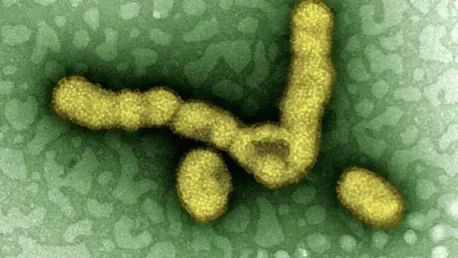Farmers in Dorset have been advised to reinforce their biosecurity measures following the detection of the avian influenza virus, specifically the H5N1 strain, in a sheep in Yorkshire. The occurrence of this virus in a sheep for the first time serves as a crucial reminder for farms, particularly those with a mix of poultry and livestock, to maintain rigorous biosecurity practices. Despite the low risk posed to livestock, UK Chief Veterinary Officer Christine Middlemiss has emphasized the importance of “scrupulous cleanliness” and urged animal owners to report any signs of infection to the Animal Plant Health Agency (APHA) without delay. The presence of influenza of avian origin in livestock is not entirely unprecedented, as cases have been reported previously in dairy cows in the US, underscoring the importance of vigilance.
Dr. Middlemiss has called on all livestock keepers to remain alert and vigilant for signs of avian influenza following recent outbreaks. She underscored the necessity of maintaining good biosecurity practices to protect the health and welfare of animals and to prevent the spread of the disease in case of an outbreak. Nigel Bennet, livestock area manager for Northern Europe at Roam Technology, a biosecurity specialist, echoed these concerns, highlighting prevention as the best defense. He urged farmers to take proactive measures such as restricting unnecessary visitors, disinfecting clothing and equipment, and closely monitoring animal health to safeguard their farms.
Key Steps for Biosecurity Enhancement
Nigel Bennet outlined seven essential areas where farmers can fortify their biosecurity defenses. Developing a comprehensive biosecurity plan in collaboration with veterinarians is the first step. This plan should include physical barriers, hygiene protocols, and emergency procedures tailored to each farm’s specific needs. Thorough cleaning and disinfection of all vehicles, boots, equipment, and housing using DEFRA-approved disinfectants are crucial to minimize the risk of disease transmission. Monitoring and restricting farm access, particularly through visitor management, can further reduce the potential spread of pathogens.
Quarantining new or returning stock for at least 21 days is another vital aspect of biosecurity. During this period, animals should be housed separately and monitored for any signs of disease. Effective pest control and secure feed storage are important measures to prevent rodent and wildlife interactions, which can introduce diseases to the farm environment. Optimizing housing conditions by ensuring good ventilation, cleaning high-traffic areas, and maintaining water hygiene are also essential practices that contribute to overall biosecurity.
Daily health checks of livestock are paramount to early disease detection and prevention of outbreaks. By establishing routine health monitoring protocols, farmers can identify and address potential health threats promptly. Bennet emphasized that biosecurity is not merely a reactive measure but should be an ongoing priority for farmers to protect their businesses and animal welfare from potential disease threats year-round.
The Role of Farmers in Disease Prevention
Avian influenza is notifiable in all poultry and other captive birds, as well as being reportable in both kept and wild mammals. Farmers are urged to report any suspicious signs of infection to the APHA immediately. This prompt reporting enables timely interventions to control and prevent the spread of the disease. For assistance, farmers in England can contact the APHA helpline at 03000 200 301, while those in Wales and Scotland can reach the APHA through local field services offices or designated helpline numbers.
Vigilance and proactive measures by farmers are crucial components in the broader effort to control avian influenza and other infectious diseases. By adhering to strict biosecurity protocols and promptly reporting any abnormalities, farmers can play a significant role in safeguarding both animal and public health. The recent detection of H5N1 in a sheep underscores the need for heightened awareness and ongoing commitment to biosecurity practices.
Vigilance and Future Considerations
Farmers in Dorset are being urged to strengthen their biosecurity measures after the H5N1 avian influenza virus was found in a sheep in Yorkshire. This rare detection of the virus in a sheep highlights the need for farms, especially those with both poultry and livestock, to uphold strict biosecurity protocols. Despite the minimal risk to livestock, the UK’s Chief Veterinary Officer, Christine Middlemiss, emphasized the critical importance of rigorous cleanliness and encouraged animal owners to promptly report any infection signs to the Animal Plant Health Agency (APHA).
The appearance of avian-origin influenza in livestock isn’t new, as similar cases have been reported in dairy cows in the US, stressing the need for constant vigilance. Dr. Middlemiss urged all livestock owners to stay alert for avian influenza symptoms and maintain high biosecurity standards to protect their animals’ health and welfare. Nigel Bennet, livestock area manager for Northern Europe at Roam Technology, supported this stance, pointing out that prevention is the best defense. He recommended limiting visitors, disinfecting clothing and equipment, and closely monitoring animal health to ensure farm safety.









